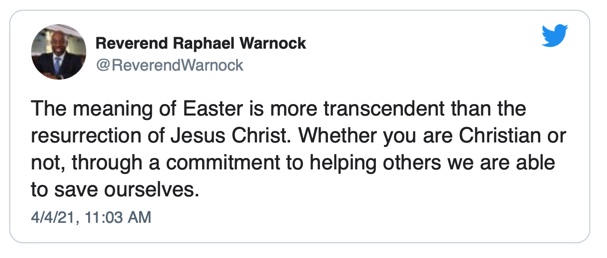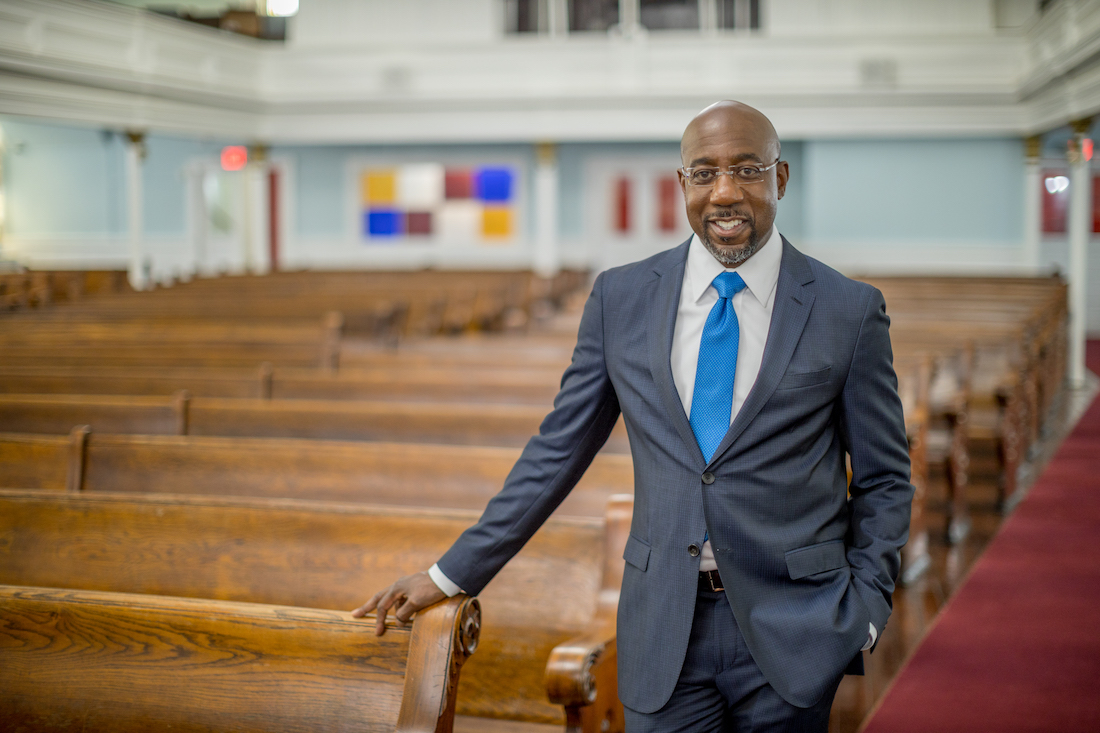The most insightful critics of Marxism said that socialism’s greatest failure comes not from economics but anthropology and theology. Sen. Raphael Warnock, D-Ga., put that reality on display on Easter Sunday, when he tweeted that collective social action “is more transcendent than the resurrection of Jesus Christ.”
On the holiest holiday on the liturgical calendar, Warnock wrote:
The meaning of Easter is more transcendent than the resurrection of Jesus Christ. Whether you are Christian or not, through a commitment to helping others we are able to save ourselves.

Warnock had previously asserted from the pulpit that “the early church was a socialist church” and that embracing state intervention into the economy “actually makes you a Christian.”
Warnock’s latest tweet caused such backlash that he scrubbed it from his social media – but not before numerous commentators accused the democratic socialist of “heresy.” Others rushed to his defense.
MSNBC host Joy Reid tweeted in pique: “This lady is literally calling the pastor of Ebenezer Baptist Church — The Rev. Dr. Martin Luther King Jr.’s church – a heretic.” That kind of argument from authority only convinces those who hold the doctrine of Ebenezerian Infallibility – the novel notion that God will supernaturally preserve anyone associated with any church that once employed Martin Luther King Jr. from falling into heresy – of which Reid is the first known exponent.
For those conversant with the Bible, heresy seems an apt description of Warnock’s couplet.
Christians of every background – Roman Catholic, Protestant, and Eastern Orthodox – agree that literally no event in cosmic history transcends the importance of Jesus Christ’s resurrection from the dead. Jesus’ destruction of death and harrowing of Hell hold preeminence even among the other precious truths revealed by the four evangelists, such as His teachings and miracles. Orthodox Christianity relies on the Apostle Paul’s extended argument in I Corinthians 15: “[I]f Christ be not risen, then is our preaching vain, and your faith is also vain,” he writes, and “ye are yet in your sins” (vs. 14, 17). Christianity’s formation of Western culture echoes through the ages, as Easter remains one of our most important holidays.
Nor does Warnock redeem himself by claiming we can “save ourselves.” Soteriologically, human beings lack all capacity to effect their own salvation (Ephesians 2:8). Observing worldly affairs proves that this principle operates on earth as in Heaven. Scripture and history reveal the human heart’s commitment to selfishness, hatred, and cupidity (Genesis 8:21, Jeremiah 4:14, Matthew 15:18-20, Mark 7:20-23) differs little in our day from its antediluvian status, when man’s mind pondered “only evil continually” (Gen. 6:5). To confer great power upon such a creature would be catastrophic folly.
Compare Warnock’s tweet with the Easter message of UK Prime Minister Boris Johnson. Johnson said that, while secular Brits may celebrate Easter primarily through eating sweets, “Let’s not lose sight of the fact that this is Christianity’s most important festival.” He, too, cited Christians’ good works on earth, but in a radically different context:
If there’s one thing British Christians have shown us this year, it’s that Jesus Christ is “the way, and the truth, and the life” – not just today, but every day. His teachings and the message His death, and resurrection permeate through every aspect of daily life. That’s why I’ve lost count of the number of church leaders and congregations who have stepped up to support us all in these very challenging times – millions of Good Samaritans, each of them showing what loving thy neighbor really looks like in twenty-first century Britain.
The arrival of Easter brings with it new hope.
And, this year more than ever, it brings the promise of brighter days ahead for us all.
So stay safe, keep following the rules, and have a very happy Easter. pic.twitter.com/BQs4oCn57N
— Boris Johnson (@BorisJohnson) April 4, 2021
Warnock placed social action above the mystery of the Resurrection. Johnson said that Christians’ good works cascade downward and flow naturally from their faith in the risen Christ. Warnock claimed that human beings must save themselves. Johnson, the first British prime minister baptized Catholic, realized that our eternal fate relies on Jesus Christ. Warnock’s worldview holds that salvation is contingent on the coordinated political action of all of humanity, directed toward creating an earthly utopia. Johnson, who has long extolled Adam Smith, believes faith in Christ manifests itself through an infinite number of spontaneous acts of righteousness.
The early church settled the tension between these two views – one orthodox, the other heterodox – in its earliest times. St. Ignatius of Antioch, who is recorded as having studied under the Apostle John, wrote in his Epistle to the Romans around 107 A.D.:
[A]ll the kingdoms of this earth, shall profit me nothing. It is better for me to die on behalf of Jesus Christ, than to reign over all the ends of the earth. For what shall a man be profited, if he gain the whole world, but lose his own soul? Him I seek, who died for us: Him I desire, who rose again for our sake. This is the gain which is laid up for me.
The saint described our earthly life as “a state of death.” The only certain remedy for death came as Jesus Christ silently emerged from the sepulcher on the first Easter Sunday. What a tragedy if a national leader were to downplay that eternal and defining truth for political advantage.

